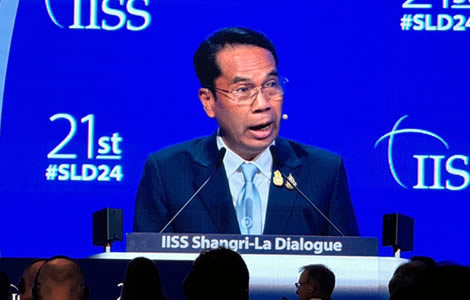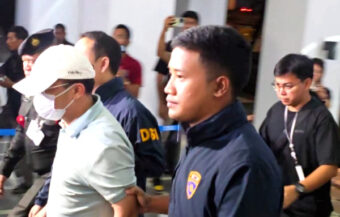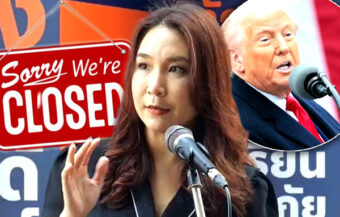Thailand’s Defence Minister emphasised the importance of maritime security and cooperation for peace at the Shangri-La Dialogue in Singapore. Amid rising US-China tensions, he warned of the risks of miscommunication.
Thailand’s Minister of Defence spoke on Sunday at the annual Shangri-La Dialogue summit in Singapore. He spoke of the importance of maritime security and cooperation with Thailand. At the summit, there was progress on Friday with a bilateral meeting between US Secretary of Defence Lloyd Austin and his Chinese counterpart Admiral Dong Jun. However, on Sunday, Defence Minister Dong made clear China’s firm stance relating to Taiwan. Significantly, he also warned the Philippines that his country’s patience was limited. This follows a more robust line from Manila since it strengthened its alliance with the United States. Roiling South China disputes have now become a significant potential flashpoint for the possible eruption of hostilities in Asia.

On Sunday, Thailand’s Minister of Defence Sutin Klangsaeng addressed the international Shangri-La Dialogue in Singapore.
The event comes amid raised tensions in the Indo-Pacific between China and the United States, supported by key Western allies.
In particular, following intense clashes between the Philippines and Chinese naval forces.
These have taken place near the Scarborough Shoal in the South China Sea.
In addition to this, China has just concluded the most intense and threatening military exercises in history off Taiwan.
Thailand has always been a key trading centre. Formerly known as the ‘Golden Land’ so Mr Sutin reminded his audience as he talked of peace and stability
Mr Sutin addressed the event’s 2024 theme of ‘Connecting the Indian Ocean and Pacific Security.’
In short, he reminded the audience that Thailand is a key trading centre in the region. Previously known as ‘Suvarnabhumi Land’ or ‘Golden Land,’ its past and future are rooted in trade.
In particular, Mr Sutin praised efforts to build trade connectivity. In this, he included China’s Belt and Road Initiative as well as the US Indo-Pacific Economic Framework (IPEF). Indeed, Thailand is a participant in both initiatives.
Certainly, Mr Sutin’s speech echoed that of Prime Minister Srettha Thavisin on May 24th at the Nikkei Forum on the Future of Asia in Japan.
Significantly, Mr Sutin referred to the rapidly advancing arms race.
In brief, he acknowledged that but insisted that modernising defence forces may not be the real threat of war or a breakdown of peace.
Real danger facing the Asia Pacific lies not in rising military spending and the modernisation of armed forces but in miscommunication and misunderstanding
Certainly, Mr Sutin saw the danger as that of misunderstandings or misestimations taken in the light of raised tension.
Mr Sutin said he was aware of the intense geopolitical strategic rivalry between the world’s key powers.
‘However, I see that strengthening modernity and military spending is not the main determinant of instability. But it is a gap in communication and building trust between each other. This can lead to misunderstandings and misestimations of the situation,’ Sutin declared.
At the outset of his speech, he thanked the International Institute for Strategic Studies (IISS) and the Ministry of Defence in Singapore for organising this year’s event.
At the same time, he praised the Singaporean government for its Maritime Information Integration Centre. In summary, this is an initiative to improve security at sea, particularly in combating transnational crime, terrorism, and other abuses. This includes illegal fishing.
Sutin spoke with pride of the Royal Thai Navy’s involvement in the ADMM-Plus platform of ASEAN and world navies seeking to improve the rule of law at sea
The Thai Minister of Defence spoke with pride about Thailand’s participation with the United States in directing the ADMM-Plus platform.
This includes naval exercises of ASEAN as well as dialogue partners. In short, these include Australia, China, India, Japan, New Zealand, the Republic of Korea, Russia, and the United States.
Mr Sutin spoke of the ‘blue economy’ and the importance of strengthening security and peaceful economic development at sea.
Thailand, along with the United States, chaired the body from 2021-2024. Now, that baton passes to Japan and the Philippines.
He emphasised the need to combat human trafficking, piracy, and maritime crime.
The Thai minister highlighted this body as an example of building trust while simultaneously pursuing economic development.
Certainly, that was a key theme for Mr Sutin. For example, he cited the wider role of Thailand’s armed forces in helping the kingdom’s economic development goals.
Finally, he was clear that maritime security was a key concern for Thailand.
Furthermore, he underlined Thailand’s wish to act as a peacemaker and facilitator at this time of raised tensions.
Friday saw a breakthrough meeting between Secretary of Defence Lloyd Austin and Admiral Don Jun, the Chinese Minister of Defence at the Shangri La summit
On Friday at the Shangri-La summit, which is growing in importance, there was a breakthrough. The US Secretary of Defence Lloyd Austin finally met his Chinese counterpart Dong Jun.
Significantly, it was the first meeting of its kind since 2022. At that time, China broke off contact at that level with the United States following former US House Speaker Nancy Pelosi’s breakthrough visit to Taipei. China viewed that act as an outrage.
Consequently, it used the visit as a pretext to step up military exercises around the island.
These exercises showed a Chinese military plan to invade the self-governing state and at the same time cut it off from external assistance.
On Friday, the 75-minute meeting appeared to have gone well. Afterwards, Chinese spokesman Colonel Wu Qian briefed reporters.
‘The two sides both agreed that a stable U.S.-China military-to-military relationship is important,’ he said after the meeting.
The Chinese spokesman clarified that further meetings are planned.
Belligerent and defiant Admiral Dong Jun on Sunday warned that anyone fostering Taiwanese independence faced destruction while he also warned the Philippines
Meanwhile, Defence Minister Dong was defiant on Sunday in his keynote address. He vowed that China would not allow geopolitics or war to be imported into Asia.
Certainly, this echoes earlier accusations from China that the United States was intent on creating an Asian NATO.
Beijing sees this in strengthening ties between the US, Japan, South Korea, Australia, the United Kingdom, and other players. Most notably of late, the Philippines, an ASEAN member.
Meanwhile, there has been rising alarm at China’s increasingly aggressive claims to the South China Sea. At the same time, allied countries are undoubtedly alarmed over its strengthening aggression towards Taiwan.
Notwithstanding, Admiral Dong spoke stridently as he indirectly attacked the United States without naming the superpower.
‘We will not allow anyone to bring geopolitical conflicts or any war, whether hot or cold, into our region,’ he said. ‘We will not allow any country or any force to create conflict and chaos in our region.’
US Secretary of Defence on Saturday applauded the Philippines for its resolute stance in defence of its sovereignty at sea against Chinese hostilities
The Chinese minister’s speech comes after Saturday’s address by Lloyd Austin to the assembly.
In short, the Secretary of Defence reiterated US support for Manila. Echoing President Biden, he said that America’s backing for the Philippines in its increasingly fractious stand-off against China was ‘ironclad.’
Taiwan’s most closely watched election since the first in 1996. Danger of war as China lashes out a warning
Ironclad partnership heralded as Marcos visits Washington amid raised South China Sea tensions
This includes increasingly robust and frequent actions by Chinese coast guard vessels and naval militias against Philippine vessels. Manila insists on upholding its claims at sea.
In addition, Secretary Austin praised Philippines President Ferdinand Marcos Jr. He said the Philippines leader’s approach was ‘about how the Philippines is standing up for its sovereign rights under international law.’
The Philippines under Marcos has strengthened ties with Washington. For instance, it has given America critically important access to important Philippine military bases in the region.
US defence chief appears to anticipate an accident in the region linked with potentially dangerous skirmishes and exchanges with Chinese military services
At the same time, this weekend, Secretary Austin moved to anticipate the danger of a military accident in the Indo-Pacific.
Experts certainly warn such a development is increasingly likely.
This comes with provocative actions from Chinese armed forces both in Philippine waters and off Taiwan in the air.
‘There are a number of things that can happen at sea or in the air, we recognise that,’ Mr Austin said. ‘But our goal is to make sure that we don’t allow things to spiral out of control unnecessarily.’
China’s Defence minister warns the US and Philippines
Nonetheless, the Chinese Defence Minister, on Sunday, warned America over its support for Taiwan.
‘We will take resolute actions to curb Taiwan’s independence and make sure such a plot never succeeds,’ Minister Dong asserted. ‘Anyone who dares to separate Taiwan from China will only end up in self-destruction.’
Similarly, there was a clear warning for the Philippines.
Minister Dong accused Manila of being ‘emboldened by outside powers.’ At the same time, he insisted that China’s culture was ‘anchored in universal love and non-aggression.’
Thereafter came the threat.
‘China has exercised great restraint in the face of such infringements and provocations,’ 63-year-old Admiral Dong Jun asserted. ‘But there is a limit to our restraint.’
Join the Thai News forum, follow Thai Examiner on Facebook here
Receive all our stories as they come out on Telegram here
Follow Thai Examiner here
Further reading:
China’s Embassy calls on Thai media to censor its coverage of Taiwan to protect relationships
War with China is a rising spectre that must be confronted as US General predicts conflict by 2025
Bad news from Beijing with Xi’s rise, the prospect of war and a divided world have greatly grown
Abe’s legacy will be his efforts to awaken Japan and build a defensive alliance against China
Former Pheu Thai finance minister expresses unease about US regional moves to counter China’s rise
Prayut unveils 3 ‘R’ strategy for a deeper and broader partnership with the US on the economy
Thailand and Japan announce defence pact on visit by Japanese PM to Bangkok ahead of US summit
US ASEAN summit as ‘dangerous directions’ now emerging in Asia as China’s regional power rises


















